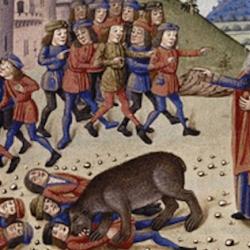James K. Mead has a fine article on 1 Kings 13 from an issue of VT several years ago. He proposes a parallel structure for the whole chapter: Scene 1 (vv. 1-10) matches scene 3 (vv. 20-25); in both there is a calling out, a pronouncement from Yahweh, a sign, and a triple repetition of the phrase “by the way.” Scene 2 (vv. 11-18) matches scene 4 (vv. 25-32): In both the prophet hears something, saddles his donkey, goes and finds the man of God, brings him back (though he’s dead the second time), and then speaks. One of the key points that emerges from this is that the man of God moves into the slot of Jeroboam, in that both are confronted by a condemning prophet for disobedience. The fate of the man of God thus serves as a warning to Jeroboam, a warning that falls on deaf ears (13:33-34).
Mead also suggests that the narrative hints at parallels between Jeroboam and the prophet’s donkey. Both are “standing beside” something – Jeroboam by his altar and the donkey by the corpse. In short, Jeroboam is an ass.
The man of God, Mead points out, moves from obedience through two temptations to disobedience to death. A fairly obvious point, but putting it that way helps to clarify how the man of God is living through the story of Judah/Israel (and the story of Adam). There is also a neat pastoral point in the fact that after the man of God has successfully resisted the first temptation he falls to the second. And there is a further point in the fact that the man of God is seduced not by a king but by a fellow prophet: The real threat to the church never comes from kings, but from wolves in bishops’ (or moderators’) clothing.
The problem that the story raises is one that recurs throughout the history of Kings: Granted that the kings are surrounded by lying prophets who claim to speak in Yahweh’s name; does that give them an excuse for their sin? As Mead puts it, “is there any circumstance that can excuse a prophet’s – or a king’s – disobedience to the word of Yahweh?” Judging from the history of the man of God, the answer is a firm No. A man who disobeys because he has been lied to will still find lions lying in wait for him along the road.
Mead points to the inversion of the command-compliance pattern that is so prominent elsewhere in Kings. Normally, someone (Yahweh, for instance) gives a command, and faithful obedience is described in the very same terms as the command; God says “get up and cross and go,” and the text goes on to say, “So he got up and crossed and went.” With the man of God, the pattern works in reverse. Three times he repeats the prohibition against eating and drinking in Bethel and returning by the same way; but seduced by the old prophet he returns with the old man to eat and drink in Bethel.
Though he doesn’t emphasize it, Mead indicates that Jeroboam rebuilt the altar after it was split. This is exceedingly important. Jeroboam doesn’t just go back and continue with business as usual. If he’s going to continue to worship golden calves he has to put that broken altar back together again. This is typologically interesting: He’s worse than Aaron, who leaves the golden calf in dust after Moses destroys it. Plus, the man of God confronting Jeroboam at calves is Moses confronting Aaron at the foot of Sinai – at which time Moses broke the tablets of the covenant. Moses got new tablets for the covenant just as Jeroboam re-erects the altar, in a perverse covenant-renewal. It’s also important because it shows the depth of Jeroboam’s sin. He goes bad, and is dramatically confronted; the man of God is a proto-Josiah who ruins Jeroboam’s altar. Jeroboam has a chance to just leave it in ruins and let people go back to Solomon’s temple to worship. But he doesn’t. He sins, is rebuked, and sins again, and that seals his fate. He’s a dog returning to vomit.















